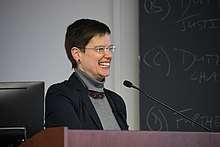Ayelet Shachar
Ayelet Shachar FRSC (born June 4, 1966) is a legal scholar. She is the Director of the Max Planck Institute for the Study of Religious and Ethnic Diversity in Göttingen. She previously held the Canada Research Chair in Citizenship and Multiculturalism at the University of Toronto. Shachar’s research concentrates on three research topics: religious diversity and gender equality, membership and borders, states and markets.
Ayelet Shachar | |
|---|---|
 | |
| Born | איילת שחר June 4, 1966 |
| Academic background | |
| Education | LLB., B.A., Tel Aviv University LLM., J.S.D., Yale Law School |
| Thesis | The dark side of multicultural accommodation: a philosophical and legal investigation into the effects of family law policies on women's citizenship status (1997) |
| Academic work | |
| Institutions | University of Toronto |
Education
Shachar earned her Bachelor of Arts and LL.B at Tel Aviv University before moving to the United States and studying at Yale Law School. After earning her LL.M. and J.S.D. at Yale, she was the recipient of Yale's W.M. Keck Foundation Fellow in Legal Ethics.[1]
Career
Shachar accepted a position at the University of Toronto in 1999 as a Visiting Professor.[2] Two years later, she published her first book, "Multicultural Jurisdictions: Cultural Differences and Women’s Rights" through the Cambridge University Press.[3] The book won the American Political Science Association’s 2002 Foundations of Political Theory Section Best First Book Award.[4] The following year, Shachar accepted an Monnet Center Emile Noël Senior Fellows at New York University.[5] Shachar was later appointed to Assistant Professor, Associate Professor, and finally became a Full Professor of Law, Political Science and Global Affairs.[2]
As she accepted her new appointment, she also became a Canada Research Chair.[6] In the following year, Shachar received grants and awards to continue her research on citizenship. In 2005, she was the recipient of the Connaught Research Fellowship in the Social Science.[7] In 2006, prior to leaving for a Visiting Fellowship at Stanford Law School, Shachar earned a grant from the Social Sciences and Humanities Research Council to research and write her new book on citizenship.[8] By 2009, she published "The Birthright Lottery," which suggested that since citizenship is transferred by birthright, an entirely new category of citizenship transfer needs to be created to correct global injustice.[9] A later article written on the theme of Citizenship, which was published in the Oxford Handbook of Comparative Constitutional Law, was the recipient of the Chapter Award of the Migration and Citizenship section of the American Political Science Association.[10]
In 2014, Shachar was elected a Fellow of the Royal Society of Canada for her contributions to the fields of international ethics and global justice.[11] The next year, she became the Director of the Max Planck Institute for the Study of Religious and Ethnic Diversity.[12] A few years later, she was the recipient of the 2019 Gottfried Wilhelm Leibniz Prize to conduct research on Citizenship in Germany.[13]
References
- "Ayelet Shachar". law.utoronto.ca. Retrieved November 19, 2019.
- "Prof. Dr. Ayelet Shachar". mpg.de. Retrieved November 19, 2019.
- "Faculty Book: Prof. Ayelet Shachar, Multicultural Jurisdictions". law.utoronto.ca. Retrieved November 19, 2019.
- "Ayelet Shachar Awarded 2019 Leibniz Prize". ias.edu. December 14, 2018. Retrieved November 19, 2019.
- "The 2002-2003 Jean Monnet Center Emile Noël Senior Fellows" (PDF). law.nyu.edu. Autumn 2002. p. 57. Retrieved November 19, 2019.
- "Profs. Shachar and Hirschl awarded Canada Research Chairs". law.utoronto.ca. January 25, 2007. Retrieved November 19, 2019.
- "FACULTY NOTES" (PDF). law.utoronto.ca. Winter 2005. p. 56. Retrieved November 19, 2019.
- "Professors Ripstein and Shachar Receive Prestigious SSHRC Funding" (PDF). law.utoronto.ca. 2006. p. 14. Retrieved November 19, 2019.
- Kelly, Cathal (May 2, 2009). "Born lucky? Then pay for it". Toronto Star. Archived from the original on November 19, 2019. Retrieved November 19, 2019.
- "Prof. Shachar wins award for chapter on "Citizenship" in the Oxford Handbook of Comparative Constitutional Law". law.utoronto.ca. June 18, 2013. Retrieved November 19, 2019.
- "Profs. Hirschl and Shachar elected Fellows of the Royal Society of Canada". law.utoronto.ca. September 9, 2014. Retrieved November 19, 2019.
- "Prof. (Univ. of Toronto) Dr. Ayelet Shachar". mmg.mpg.de. Retrieved November 19, 2019.
- "Prof. Ayelet Shachar receives a 2019 Gottfried Wilhelm Leibniz Prize, the top research award in Germany". law.utoronto.ca. January 9, 2019. Retrieved November 19, 2019.